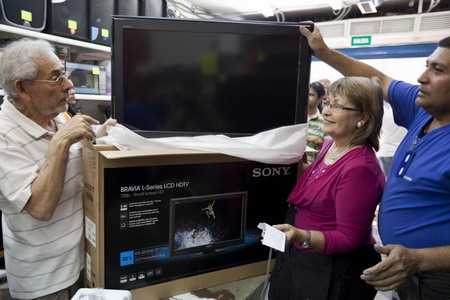Venezuelans in shopping spree after devaluation
Shouting "buy, buy, the world is going to die," Venezuelans went on a frantic shopping spree on Saturday following a sharp currency devaluation that is expected to drive up prices.
 |
|
Shoppers check electronic items in a store in Caracas January 9, 2010. [Photo/Agencies] |
President Hugo Chavez announced a dual system for the fixed rate bolivar on Friday night while much of the country was watching a baseball game.
But on Saturday, word spread quickly as people read the morning papers and listened to the radio in Caracas cafes.
Shoppers crammed into electronics stores, eager to snap up imported televisions and computers ahead of the anticipated price hikes.
"I've been lining up for two hours outside to buy a television and two speakers because by Monday everything is bound to be double the current price," said Miguel Gonzalez, a 56-year-old engineer standing in the tropical sun outside a popular store.
Opposition politicians seized the opportunity to criticize Chavez's economic management, with Caracas Mayor Antonio Ledezma saying standards of living would drop.
"If you need to buy a refrigerator for your house tomorrow, it's going to cost you twice as much as it did up till Friday," Ledezma said.
The government acknowledges prices will rise after the devaluation, but say the upward trend will be more gradual.
National television and radio stations avoided using the word "devaluation," preferring the word "adjustment." One pro-Chavez radio station responded to critics of the measure by playing a popular Argentine song called "Imbecile."
With oil crowding out other sectors of the economy, Venezuela heavily relies on imports for consumer goods, leaving it subject to big price swings depending on the exchange rate.
Older Venezuelans are accustomed to sharp losses in the value of their money, with numerous devaluations and currency regimes over the last three decades of economic turmoil.
Inflation, the highest in the Americas, at 25 percent last year, reached 103 percent in 1996 after a previous president lifted exchange and price controls.
Chavez's high-spending policies during an oil bonanza fueled a massive consumer boom and fast growth that shuddered to a halt when oil prices plunged a year ago.
The sharp drop in oil revenues also undermined the bolivar and made a devaluation inevitable at some point.
 0
0 







Go to Forum >>0 Comments